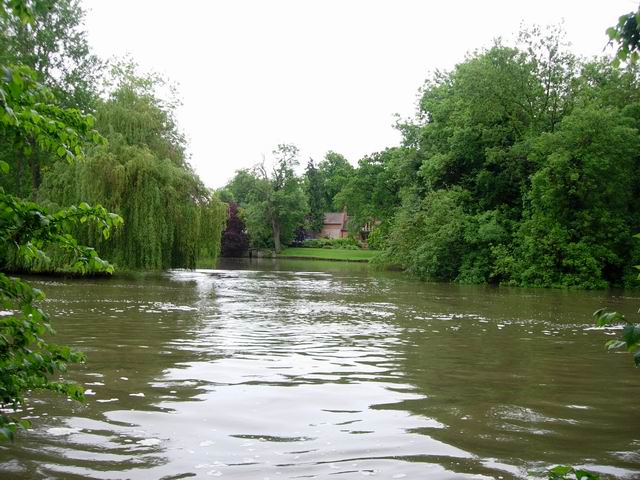Another year, another collection of books read. I must be getting slower as
I read fewer than in 2010 which was in turn
fewer than 2009. Or perhaps I'm reading longer books.
Anyway, a short few lines on each one, with links to previous and longer reviews I wrote during the year where relevant.
1. Do Not Pass Go – Tim Moore
An enjoyable and mostly entertaining jaunt around London looking at the history of the creation of the Monopoly board and an insight into how each major square has evolved since that time.
2. Why England Lose - Simon Kuper and Stefan Szymanski
An engrossing read on that perennial question of why the England football team are no good, and it was refreshing to see that we're not just useless in our inability to "get stuck in" but also due to our utter lack of technical capabilities.
3. Nocturns – Kazuo Ishiguro
An underwhelming series of short stories from an author I normally enjoy. Each one seemed too flippant and throw-away to capture the interest and all lacked a plot strong enough to remain in the memory.
4. The Thousand Autumns of Jacob De Zoet – David Mitchell
A fantastic novel, set in isolated Japan during the 1700s when its sole contact with the outside world was an artificial island used by the Dutch as a trading outpost. Probably
the best Mitchell of the lot.
5. Notes from a Big Country – Bill Bryson
A slightly tiresome serious of columns collated into a book that sees Bryson riffing on the craziness of the US of A.
6. The Hours – Micheal Cunningham
Seen the film so read the book: very clever and engaging.
7. In Europe – Geert Mak
Some 900-pages of Europe's history told by a journalist travelling around the continent at the turn of the millenium. A long-slog but great insights and anecdotes throughout.
8. Chemistry for Beginners – Anthony Strong
A clever idea of a novel told through science papers (and diary extracts), that started strongly but the plot was slightly woolly and was about 100 pages too long to really sustain the interest.
9. Why We Run – Robin Harvie
A nice, philosophical take on the notion of running, by a chap who regularly runs 40-miles each weekend. That's a lot. It felt strained at times, though, as if the quotations from the great philosophers that he uses were found beforehand and then each chapter moulded to fit around them.
10. The Terrible Privacy of Maxwell Sim – Jonathan Coe
Coe always tells a good tale and this one was no different but it just wasn't quite strong enough in any direction, either the characters, the plot or the attempts to show the madness of the world modern (See:
What a Carve Up!), as his others, but nonetheless it was enjoyable.
11. The Picture of Dorian Gray - Oscar Wilde
On purchasing a Kindle I went on a free-classic-book buying spree, with this the first work I downloaded. As witty as you'd expect and surprisingly gothic too.
12. Robinson Crusoe – Daniel Defoe
Man trapped on island and the subsequent adventure he has.
Good fun.
13. Treasure Island – Robert Louis Stevenson
I just
kept hearing the voices of the muppets in all the relevant characters having seen the Muppet's version so often during my childhood but the original work still contains plenty of excitement.
14. The Jungle Book – Ruyard Kipling
A collection of stories, rather than a single tale, which contains some elements that went on to form the bulk of the famous film, but is different in many ways. For instance, Sher Khan is killed by a stampede of wildebeest organised by Mowgli - inspiration for
The Lion King?
15. Inverting the Pryamid – Jonathan Wilson
A detailed look at the evolution of football tactics of which I still find amazing that the first formations were 2-3-5. Madness.
16. Reading like a Writer – Francine Prose
Reminded me of being back at university but it was interesting to look at some of the reasons why the best writers are just that.
17. The Corrections – Jonathan Franzen
Finally got around to some Franzen. Engrossing and moving in places but the story of Chip going to Lithuania just didn't work for me at all.
18. Trouble on the Heath – Terry Jones
A load of rubbish. Read in a day, found it lying around, waste of time.
19. To the River – Oliver Laing
Another semi-philosophical book akin to
Why We Run in essence, using the writer's affinity with Virginia Woolf and the river Ouse to contemplate her relationship with rivers, the writings it inspired, its role in history and beyond. Quite beguiling in places.
20. I’m Feeling Lucky – Douglas Edwards
Man joins small internet start up called Google, the rest is history. A bit dry in places as Edwards worked in the marketing area but nonetheless still a great insight into the madness of a company that grows from nothing to world's biggest in a few years.
21. The Good Man Jesus and the Scroundrel Christ – Philip Pullman
Pullman proves he's quite a good writer once again, with a clever take on how Christ became the cult figure he is today by stealing the thunder of his more humble brother Jesus.
22. The Atlantic – Simon Winchester
A nice read on some of the history of the Atlantic, the people around it and it's role in human history. Some chapters were a touch week but most offered some interesting insights and anecdotes on the cold, wide ocean separating half the world.
23. Freedom – Jonathan Franzen
After one Franzen,
another. This one was, for me, not quite as good as
The Corrections but an interesting, clever, damaged novel with a motley collection of characters going about screwing up their lives in unique and odd ways.
24. Player One – Douglas Coupland
A nice antidote to Franzen's endless words, with this short, fast-paced thriller taking an interesting idea that the world reaches its peak oil production and subsequent mayhem ensues. The idea only five people would be an airport cocktail lounge in a major US airport seemed a tad odd but there we go.
25. The Valley of Fear – Arthur Conan Doyle
A classic bit of Holmes, with Doyle using his two stories in one trick. First he sets up and the solves the mystery while the second half gives the back story of how the amazing turn of events came about in a sleepy English resort. A lack of Holmes in the second half is a let down but the story was interesting enough.
26. How to be Good – Nick Hornby
Another quick easy read, which took a cleverish idea and ran with it as far as it could before becoming too ridiculous. I liked the character of Katie and thought the ideas of charity and the lack of relationships with neighbours in the streets in which live for years on end were well played out, but it's hardly a Great Novel.
27. A Film by Spencer Ludwig – David Flusfeder
Not sure what I really thought about this one: on one level a simple, fun road-story about a father and son: the father dying, the son a sort of successful film director but also a bit of a failure at life. But, while it flowed nicely, I couldn't shake the feeling the author was trying a tad too hard all the time. I appreciate that's a bit woolly but that's the only way I can describe it.
28. The Sisters’ Brothers – Patrick DeWitt
One of my
favourite books of the year: a beguiling, lyrical and engrossing story of two murderous brothers heading to San Fran in 1851, the height of the gold rush, to commit, well, a murder. The historical setting let DeWitt paint some great scenes (one brother discovering toothpaste for the first time, shooting a bear that was killing his horse, meeting a mad prospector by a river), while the story is suitably engaging and strange to keep you hooked throughout. Recommended.
29. The Sense of an Ending – Julian Barnes
The Booker Prize winner and a very clever novel. Short but concise and at times reading more like Barnes musing on life than a novel, but the plot is nevertheless well structured and keeps you guessing until the end and beyond.
30. The Steve Jobs biography – Walter Issacsson
Read for work but I enjoyed this on a personal level too as there's no doubting the impact Jobs made on the world, whether you liked him or not. Jobs comes across as a huge tyrant but one who knew what he was trying to achieve and more often than not he succeeded, with almost those on the end of his tongue-lashings also revealing that their time working with him was some of their best working days.
31. Perfect Rigour – Masha Gessen
A study of a reclusive mathematician who proved the Poincare Conjecture was not a book I thought I would enjoy but Gessen tells the story as a writer first, rather than as a great maths genius (as she is too). This helps make the tale of a genius from Russian surviving the random machinations of Soviet Russia to become a great mathematician working in the US, going on to solve one of the world's most complex maths problems then reject the $1m prize a fascinating read.
32. And God Created Cricket - Simon Hughes
A slightly tiresome read, as Hughes adds a lame joke to the end of every other paragraph charting the history of cricket from Ye Olden Days to The Present Day. There's some nice colour and interesting anecdotes throughout, but the Ho-Ho sarcastic tone is too wearisome to be enjoyable.
33. Guns, Germs and Steel - Jared Diamond
Probably one of the first academic (or semi-academic) works I've read since university, this is an interesting and thought-provoking work examining the reasons why Europe and to a lesser extend Asia became the world super powers (of the last 500 years), rather than the Africas, Americas and Australia.
Diamond's argument is, roughly, that a combination of temperature, the abundance of animals and plants fit for domestication and the availability of certain materials, and a resistance, or lack there of, to disease spread by these animals, helped these areas of the world develop at a faster, more technologically advanced rate, than those without, which lead to an unfair balance when they first came into contact.














